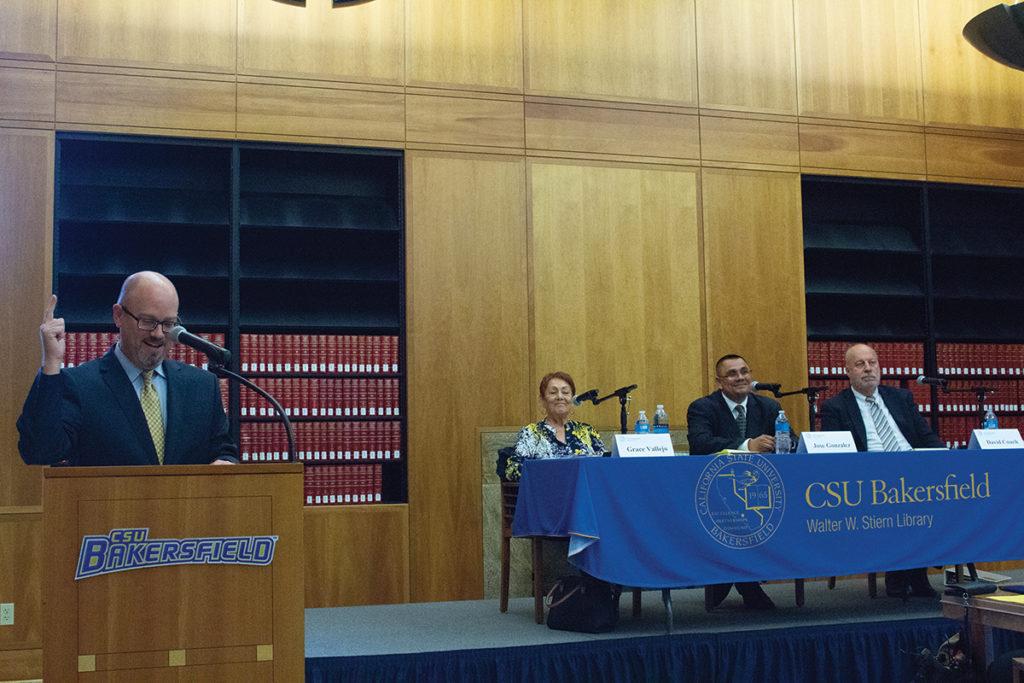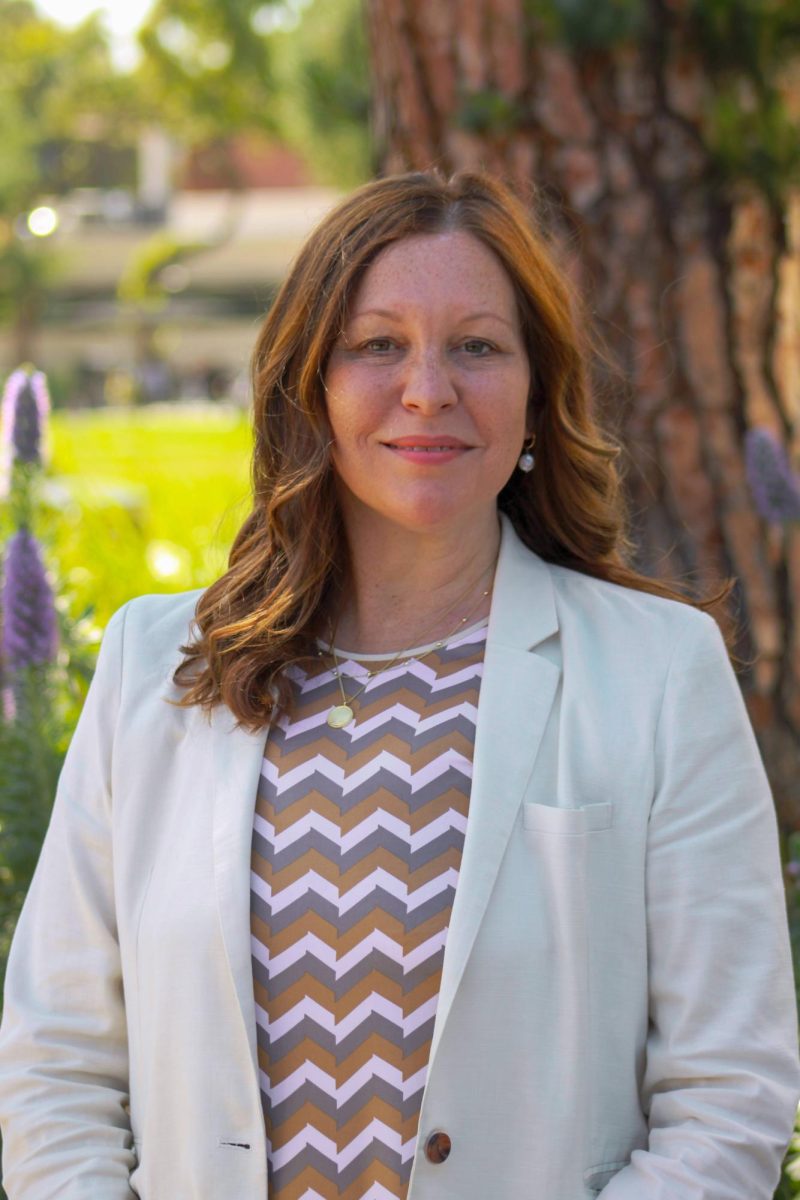Reporter
Students and community members gathered in the Dezember Reading Room of CSU Bakersfield’s Walter Stiern Library to hear candidates for Bakersfield’s 4th District Board of Supervisors position debate the issues affecting the city on Wednesday, October 10. This debate comes ahead of the November 6 election.
New district lines were approved on March 30, 2018, changing the demographics in District 4. It now includes Arvin, Buttonwillow, Delano, Lamont, Lost Hills, McFarland, Shafter and Wasco.
The candidates for the 4th District seat are Delano Mayor Grace Vallejo, credit union manager and CSUB alumnus Jose Gonzalez, and incumbent district supervisor David Couch. CSUB Vice Provost David Schector was the moderator for the debate.
Political science students researched and drafted questions for the debate. The last 30 minutes were dedicated to answering pre-selected questions from the audience. The event was sponsored by the library, the Political Science Club, the Pre-Law Society and the Political Science Department of CSUB.
Steve Bacon, Dean of the School of Social Sciences and Education, welcomed the attendees. “I’m particularly happy to see so many students here,” said Bacon, adding, “You understand that the only way we can improve our communities is if we are committed enough to become aware, and then to get involved.”
Sophomore Spanish major Anna Gonzalez admits she came to earn extra credit in class, but also wants to learn more about politics. “I’m not that knowledgeable about politics. I don’t even know what a supervisor is, so, I’d like to be more knowledgeable about politics in our community.”
John Nilon, a CSUB alum and alumni trustee, said campuses should “have this free exchange of ideas and to allow students to be exposed to what their future supervisor thinks, believes, values, [and] honors.” Nilon continued, “This is a group of students where this may be their first time voting. So, what a great opportunity it is on campus to get a chance to be exposed to these people running for office.”
Immigration, school safety, the environment, marijuana, and homelessness were among the topics discussed.
Immigration
Vallejo said she thinks President Trump’s immigration policy and United States Immigration and Customs Enforcement has evoked fear in the community. She emphasized the role of ICE in the deaths of two Delano residents in March 2018. “I don’t believe that ICE agents should be handling situations the way they are handling them now. That has got to stop,” said Vallejo.
Gonzalez said, “I don’t believe that local law enforcement should be doing the job of ICE. I don’t think that communication should be there.” He believes immigrant families are here looking for a better life for their families, adding, “I’m an example of it.”
Couch agreed, saying, “I don’t think ICE agents should be doing the job of local law enforcement and vice versa. They are two separate distinct groups that should do two separate distinct things.” He went on to say that he does believe law enforcement should cooperate with ICE in cases where undocumented immigrants are being released from jail or prison.
Couch said ICE may have to go into the neighborhoods to keep the community safe from violent offenders, but they should not be targeting community members who are just trying to feed their families.
In response to that, Gonzalez and Vallejo both said that ICE agents are not going after violent criminals in their community. Vallejo explained, “They’re actually stopping law abiding families. They’re also stopping students. We had that incident [the detention of student Jose Bello] here in Bakersfield at BC.” She went on to add, “People are living a good life here, yet they are being treated as criminals, and that’s what I think is wrong.”
When asked if Kern County should be a sanctuary county, Gonzalez said he believes it should. He said we should protect “good, law-abiding immigrants” and that community members should not have to fear law enforcement.
Couch said the term sanctuary county “is an effort by some people to appear that they are doing something for a group of people when in fact I don’t think they’re doing anything.” He reiterated that ICE should focus on deporting undocumented immigrants who are already in the prison system.
School Safety
Couch said he thinks each school should have a school resource officer but there is neither enough money nor qualified candidates for those jobs.
As city mayor, Vallejo has already worked out an agreement with Delano schools to help secure extra funding for additional resource officers, but opposes the use of firearms for school protection. “I do not believe teachers should be carrying guns. I’m sorry but sometimes a teacher with a gun is not the safest thing.”
Gonzalez said not only do police officers need to be protecting schools, there also needs to be a greater focus on mental health and counseling in schools.
Environment
On the environment and clean water, Gonzalez said he wants to look into providing resources like grant money and environmental research for the water companies.
Couch said, “The answer cannot be ‘We’re going to throw money at this problem and we’re going to fix it’,” reminding the audience that there is not enough money in the county budget to provide resources to all the water districts. “There’s two Sheriff’s deputies sitting up front. We can’t and have not given them a raise in long time, and there’s not enough deputies on the street, but you’re [Gonzalez] suggesting we spend general fund dollars to help water districts that have tons of money,” Couch said.
Vallejo said she has been proactive in Delano by shutting down contaminated wells. “We did find some technology that cleans the water,” Vallejo said. She acquired a grant to fund the $4 million project. She advocates for working with all of the different agencies to provide resources to clean the water, emphasizing that private and public entities should work collaboratively to secure grants and funding.
To improve air quality, Vallejo advocates for more clean air vehicle incentives and more charging stations along Highway 99.
Couch said the focus needs to be on natural gas to bridge the gap between where we are now to everyone driving electric cars.
Marijuana
“It’s already legal in California,” Vallejo said. She believes her job will be to ensure the rights of the voters and medical marijuana patients. She said she wants to look for ways to prepare and move Kern County forward, because she expects it will be made legal at the federal level eventually. “Why wait until it happens?” she asks. “At least you have it [a plan for local regulation] somewhere on the books, on the shelf, waiting to bring it down once the voters declare what they want. So I do believe we should be working on this already,” Vallejo said.
Gonzalez recognizes the rights of patients, but worries about keeping cannabis away from kids. Couch recently voted against marijuana initiatives put to the Board of Supervisors and is worried about the cost of code enforcement. Both are concerned with how and where tax revenue would be stored if commercial sales were legalized. Since marijuana is still federally illegal, money from the marijuana industry cannot be stored in a federally monitored bank.
“At the same time we didn’t adopt the ordinance, we did certify the Environmental Impact Report, and that’s still useful. We have more discussions about this than people realize,” Couch said, adding that the cost of enforcing compliance with the ordinance may not be offset by the tax revenue.
Homelessness
Gonzalez wants to figure out why people are out there homeless to begin with. More affordable housing, working with the mental health community, and finding more resources for facilities are some of his ideas to help get people off the streets.
Couch said people need jobs, and by partnering with the homeless center, they are able to provide training and work. He said we need to adopt policies to bring more companies like L’Oreal and Amazon into Kern County.
Vallejo said there is a need to identify those that need help and get them into a work program. She also pointed out that Kern County’s poverty rate is 14 percent while the rate in District 4 is double that, at 28 percent.
As the closing question, Vallejo and Gonzalez were asked what they would do differently from Supervisor Couch.
Vallejo said she’d work with the various county administrative departments to find out what they need before making any decisions. “If you don’t know what they need, how can you decide what to put your money into?” Vallejo asked.
Gonzalez said he’d also get input from all the different departments, but also work with the state legislature and federal government to lobby for local funding. “When we partner with the state and federal government, they can allow us to [access] some of those grants that are available and bring those back, and that’s an investment in our community.”
When Couch was asked what he would do differently, he said, “I will probably be more open about what I am trying to accomplish and talk about it at board meetings.” He said that in the past he was too nice. “Going forward I’m going to be a little more forceful than I’ve been.”







